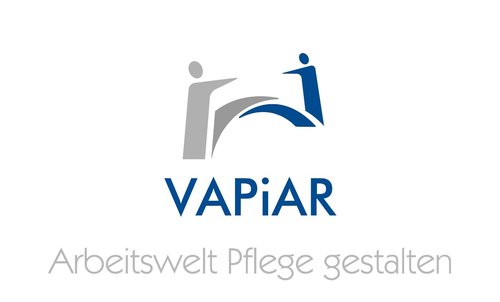VAPiAR Verbesserung von Arbeitsbedingungen in der ambulanten Pflege durch innovative Arbeitskonzepte in der Region
Motivation
In view of demographic change, ensuring the provision of care is one of the greatest challenges of the future. The increasing number of people in need of care is met by a decreasing number of nursing staff. Parallel to these developments, the demands of everyday care are also increasing, e.g. due to more complex disease patterns. The use of new technologies is a promising way to counter the nursing personnel shortage. This has the potential to maintain the independence, self-determination and quality of life of those in need of care, as well as to relieve the burden on care professionals and family caregivers. In this way, more space is created for interpersonal attention in care.
For some years, there have therefore been efforts to improve working conditions in care through technological innovations. Unfortunately, many of the systems developed are hardly used in practice. One of the reasons for this is that nursing staff are often insufficiently involved in the development and testing. Accordingly, their actual needs are not sufficiently taken into account.
As a result, some of the systems developed do not fulfil functions that caregivers consider relevant to their work process. Many digital solutions are also perceived as inefficient and complicated and are therefore either not even purchased or their use is abandoned after a short time in favour of conventional methods.
This problem is being prevented within the framework of the interdisciplinary joint project VAPiAR by conducting interviews with care workers from three care services to determine their actual needs. The selected technological solutions are integrated into a consistent overall concept and their use is communicated within the framework of training measures.
Goal
The overarching goal is to support and improve work processes in outpatient care in facilities in the district of Plön and the surrounding region through the needs-based use of existing care technologies and the development of new ones.
With the VAPiAR Living Lab, an interdisciplinary platform is created, in which technology-supported processes of outpatient care are demonstrated, discussed and further developed. The technologies of the Living Lab will be selected and further developed in a participatory process with the end users. At best, a continuation of the facility in the form of a competence centre will be achieved beyond the project duration.
An important part of the VAPiAR project is the consideration of the ethical, legal and social aspects of the development and implementation of the respective care technologies (ELSA - ethical, legal and social aspects). First of all, this includes the question of evaluating the effects of an implementation of nursing technologies on the professional self-image and the professional practice of the nurses. In addition, there are the questions of privacy, data protection and informational self-determination on the part of the care recipients as well as the care personnel themselves. Finally, especially in view of the conditions in a structurally weak region, questions of ethics of justice regarding the possibilities of choice and possible differences in quality between humane and technically assisted care must be dealt with.
Internal Leader
External Leader
Dr. Michael Bau (ILAG)Scientific Director
Kirsten Harms, Heike Thomsen, Ortrud Leßmann, Miriam Schwanholt, Tobias Krahn, Andreas Hein, Michael Bau ; Abstractband - 5. Clusterkonferenz "Zukunft der Pflege" ; 09 / 2022
Kirsten Harms, Pascal Hinrichs, Kathrin Seibert, Dominik Domhoff, Karin Wolf-Ostermann, Andreas Hein; Zukunft der Pflege. Tagungsband der 6. Clusterkonferenz 2023; 2023
Meike Ahlers, Kirsten Harms, Tobias Krahn; Die Schwester Der Pfleger; 001 / 2023
Ellerich-Groppe, Niklas; Krahn, Tobias; Schweda, Mark; Hein, Andreas; Mit Pflegeinnovationen die Zukunft gestalten – menschlich, professionell, digital.; 2023
Kirsten Harms, Tobias Krahn, Fynn Bredehorn, Andreas Hein; GMDS 2024 - Abstractband; 009 / 2024
www.ilag.net
www.laroma.de
www.laromed.com
www.johanniter.de
www.kirche-ps.de/diakonisches-werk
www.awo-pflege-sh.de/einrichtungen/awo-service-und-wohnzentrum-schoenkirchen/haeusliche-pflege

Contact
Duration
End: 30.04.2024
Website of project
Source of funding



